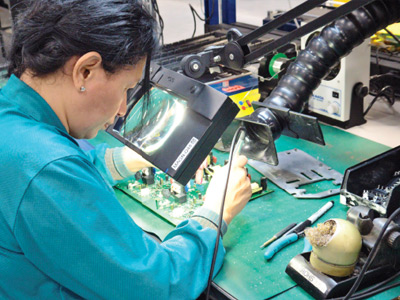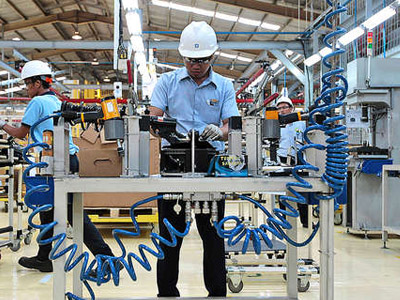 Corporate Income Tax
Corporate Income Tax
One of the lowest corporate income tax rates in the nation is found in South Carolina. The corporate income tax is primarily based on federal gross and taxable income solely from business activity conducted in South Carolina. Companies engaged in multi-state activities do not pay taxes for income derived from any business activity outside of South Carolina.
Annual corporate income is based on the following:
- Income allocated to South Carolina operations (interest, dividends, royalties, rents, property sale gains and losses, and personal services income); and
- Income apportioned to South Carolina. South Carolina offers a single factor sales apportionment formula.
The company’s state corporate income is calculated by applying a 5% corporate income tax rate to the annual corporate income.
 Sales and Use Tax
Sales and Use Tax
The sales and use tax rate is 6 percent in South Carolina. Counties, by approval of a majority of county voters, may assess an additional one to two percent local option sales tax. There are a variety of sales tax exemptions for companies. Pickens County has a 1 percent local option sales tax. The prior year’s local option sales tax revenue is used in the calculation to determine the local option sales tax credit for the current year. This credit is applied to reduce the property taxes in Pickens County.
 Property Tax
Property Tax
Only local governments may levy property taxes in South Carolina. A company’s property tax liability is a function of: Property Value x Assessment Ratio x Millage.
The Department of Revenue determines the fair market value of a business’ real property (land and building) and personal property (machinery and equipment) to assure equitable local treatment. The fair market value is then assessed at rates established in the state constitution. For manufacturers, real and personal property are both assessed at 10%. The assessment ratio for all other businesses is 6% for real property and 10% for personal property. (For homeowners, primary residences are assessed at 4%.)
The local millage rate is applied to the assessed value to determine the property taxes. Millage rates in South Carolina are site specific and set annually by local government. A mill is equal to $0.001.
Tax Example: (assumes manufacturer & non-depreciable asset)
$10 Million investment x 10% assessment ratio x .2287 millage rate = $228,700 annual tax (before abatement)
In support of business, South Carolina exempts three classes of property from local property taxation: all inventories (raw materials, work-in-progress and finished goods); all intangible property; and all pollution control equipment.
 Corporate Licensed Tax
Corporate Licensed Tax
All corporations must pay an annual tax to the Department of Revenue. The rate is one mill per dollar ($0.001) of a proportion of total paid-in-capital and paid-in-surplus, plus $15. Earned surplus (retained earnings) is not included in the base when calculating this tax. For corporations doing business outside the state, the license tax is determined by apportionment—the same way South Carolina corporate income tax is computed. The minimum corporate license tax is $25.
Please visit the SC Department of Revenue’s Tax Guides for a detailed explanation of South Carolina’s business taxes.

ReadySC
As an integral part of the SC Technical College System, The Center for Accelerated Technology Training and its readySCTM program work together with the sixteen technical colleges to prepare South Carolina’s workforce to meet the needs of your company. Tri County Technical College serves the Pickens County community. Established in 1961, readySCTM is one of the oldest and most experienced workforce training programs in the United States. They are ready to bring this experience and expertise to work for your company. To learn more, visit www.readysc.org.
Apprenticeship Carolina
A registered apprenticeship is an employer-sponsored position for students to simultaneously learn and earn hands-on experience. It consists of two complementary components: a supervised on-the-job training provided by an employer at the workplace and related technical instruction. Employers with registered apprenticeship programs are eligible to receive a tax credit of $1,000 for each registered apprentice employed for at least 7 months during each year of his or her apprenticeship program, for up to four years. To learn more, visit Apprenticeship Carolina.


Enterprise Zone Retraining Credits
Retraining credits are a cash rebate of $1,000 per year per employee for up to 5 years of retraining for existing production employees. Employers must match each $1 rebated with training expenses of $1.50.
Workforce Innovation and Opportunity Act (WIOA) & SC Works Business Solutions
Potential grant funding is available for on-the-job training, incumbent worker training programs, customized training for new employees up to 50% of training costs for new employees, and reimbursements for training of WIOA referrals. WIOA assistance complements the support provided by ReadySC.


Jobs Tax Credit – Statutory
South Carolina rewards companies for job creation by reducing corporate income tax liability. The job tax credit is a financial incentive rewarding new and expanding companies for job creation in South Carolina. Companies must create and maintain a certain number of net new jobs in a taxable year.
The number of new jobs is the increase in the average monthly employment from one year to the next.
Requirements and Related Values:
Must file form TC-4 or TC-4SB with corporate tax return to the SC Dept. of Revenue. See www.sctax.org for more information.
1. Manufacturing, processing, agricultural packaging, warehousing and distribution, research and development, agribusiness operations and qualifying technology-intensive facilities must create a monthly average of 10 net new jobs.
Note: Technology Intensive Facilities as defined by NAICS codes:
- 541711 – research and development in biotechnology
- 541712 – research and development in physical, engineering and life sciences
- 518210 – data processing, hosting, and related services
- 9271 – space research and technology
- 51811- internet service providers with web search portals
- 541711 – research and development in biotechnology
- 541712 – research and development in physical, engineering and life sciences
- 518210 – data processing, hosting, and related services
- 9271 – space research and technology
- 51811- internet service providers with web search portals
2. Corporate office facilities housing a majority of the headquarters functions must create a monthly average of 10 net new jobs.
3. Qualified service-related facilities must meet the following criteria in order to qualify: If the facility is engaged in an activity listed under the North American Industry Classification System Manual Section 62, subsectors 621, 622 and 623 or Section 4881, subsector 488190, the facility must create a monthly average of 10 net new jobs.
Pickens County is a Tier II County, determined by the Department of Revenue. In accordance to this ranking, a facility must create in a single taxable year a monthly average of:
- 175 new jobs;
- 150 new jobs in a building that has been vacant for at least 12 months;
- 100 new jobs with an average salary 1.5 times the lower of the state or the county per capita income;
- 50 new jobs with an average salary 2 times the lower of the state or the county per capita income; or
- 25 new jobs with an average salary 2.5 times the lower of the state or the county per capita income. The value of the credit depends on the county’s development tier (Pickens County is Tier II at $2,750)
Example:
100 Employee Manufacturer to create 30 jobs
30 jobs x $1500 = $45,000 annual value
5 year value = $225,000
“Small Business” – If the company is a manufacturing, processing, agricultural packaging, warehousing and distribution, research and development, agribusiness or qualified technology-intensive facility or a corporate office that has fewer than 99 employees worldwide, the company could qualify for the Small Business Jobs Tax Credit by creating a monthly average of two net new jobs, instead of 10. Under the Small Business Jobs Tax Credit, the company may only get the full credit amount for net new jobs that pay 120% of the county’s average hourly rate. For jobs that pay less than 120% of the county’s average hourly wage rate, credits from $750 to $12,500 per job (or $1,750 to $13,000 in a multi-county industrial park) may be available for qualifying companies.
Corporate Headquarters Credits – Statutory
In an effort to offset the costs associated with relocating or expanding a corporate headquarters facility, South Carolina provides a generous 20% tax credit based on the value of the actual portion of the facility dedicated to the headquarters operation or direct lease costs for the first five years of operation. The credit can be applied against either corporate income tax or the license fee. These credits are not limited in their ability to eliminate corporate income taxes and can potentially eliminate corporate income taxes for as long as 10 years from the year earned. Eligibility for this credit is determined by meeting each of the following criteria:
1. The company must create a minimum of 40 new full-time jobs that are engaged in corporate headquarters or research and development. At least 20 of these jobs must be classified as staff employees. (Headquarters staff employees are executive, administrative or professional workers performing headquarters related functions and services. An executive is an employee who spends 80% of his or her time on corporate-wide duties.)
2. The facility must be the location where the majority of the company’s financial, legal, personnel, planning and/or other staff functions are handled on a regional or national basis.
3. The facility must be the sole corporate headquarters within the region or nation with other facilities that report to it. A region is defined as a geographical area comprised of either five states (including South Carolina) or two or more states (including South Carolina) if the entire business operations of the company are performed in fewer than five states
Job Development Credit – Negotiated
South Carolina’s Enterprise Program is substantially different from the state’s other tax incentives because it does not reduce a particular tax liability; instead, it provides companies with funds to offset the cost of locating or expanding a business facility in this state. Representing actual cash contributions to the project, this incentive allows South Carolina to lower the effective cost of investment and positively contribute to a company’s bottom line and profitability.
The Job Development Credit effectively uses the personal withholding taxes of new employees to reimburse qualified, approved companies that add value to South Carolina and the community in which they locate. These reimbursements are for eligible capital expenditures (land, building, site development, pollution control equipment or infrastructure) associated with projects creating new full-time jobs that also provide health care benefits for South Carolina citizens.
The Coordinating Council administers the Enterprise Program. Funds for the Job Development Credits come from state personal income tax withholding that is paid by a company’s employees. Employees receive a credit equal to the withholding used by the company; therefore, there is no financial impact on employees. No company will be allowed to claim a credit on any employee whose job was created in this state before the taxable year in which a company was approved for the program. In addition, the Coordinating Council generally caps annual collection at no more than $3,250 per employee per year.
To verify capital expenditures and qualifying jobs, a company is required to make its payroll books and records available for inspection by the Coordinating Council and the Department of Revenue. In addition, a company must furnish a report prepared by the company that itemizes the sources and uses of the funds, and such report must be filed by June 30 following the calendar year in which the refunds are received.
Eligibility Requirements
To be eligible to apply for the Job Development Credit, a company must:
- Meet the requirements of a manufacturing, agricultural packaging, processing, corporate office, warehouse and distribution, research and development, agribusiness, tourism or qualified service-related facility;
- Create at least 10 new, full-time jobs (or meet additional requirements if qualifying as a service facility);
- Provide full-time employees with a benefits package that includes a comprehensive health plan and pay at least 50% of an eligible employee’s cost of health plan premiums; and
- Pay a non-refundable $4,000 application fee, receive a positive cost/benefit certification (the project is of greater benefit than cost to the state) from the Coordinating Council and pay a $500 annual renewal fee.
Please note that the Coordinating Council will generally only allow companies to collect credits for 10 years, and only on new full-time jobs with wages at or above the current county average wage for the county in which the project is located.
COUNTY INCENTIVES
Manufacturing Property Tax Exemption/Assessment Ratio Reduction – Statutory
A new manufacturing property tax exemption is being phased in equally from 2018 to 2024. It will reduce the 10.5% default assessment ratio to 9%, or a reduction of 0.25% each year until full exemption goes into effect in the 2023 property tax year. The current assessment ratio is at 10% in 2020. The exemption is a reduction in a manufacturer’s property tax liability for all property (real and personal) that is not subject to a negotiated fee-in-lieu of tax (a FILOT). The manufacturer’s filing of the PT-300A is the application for this exemption.
A qualifying company may also take advantage of one of two potential County incentive programs. Depending on total investment, a company may qualify for either a five-year statutory abatement of a portion of property tax or, by agreement with the County, a negotiated fee-in-lieu-of-tax (FILOT) arrangement. Other unique options can be considered as a method to further reduce liability and is dependent on new capital investment and new job creation.
Property Tax: Value x Assessment Ratio x Millage
Tax Example: (assumes manufacturer & non-depreciable asset)
$1 Million investment x 10% assessment ratio x .2287 average millage rate = $22,870 annual tax (before abatement)
Abatement Savings Example:
$1 Million investment x 10% assessment ratio x .0561 millage abatement = $5,610 annual abatement savings of $28,050 over 5 years
Estimated taxes after the abatement in Year 1 would be $17,230.
Note: South Carolina also provides the following property tax exemptions – All inventories (raw materials, work-in-progress and finished goods), all intangible property, and all pollution control equipment.
The State of South Carolina enables Pickens County the option to extend this 5-year property tax abatement to an unrelated purchaser of real property that has formerly received the benefit of the abatement. Certain conditions for new employment and investment may apply.
Partial Property Tax Exemption—Statutory
A partial Property Tax Exemption, called an abatement, may be made available to manufacturers (investing $50,000 or more) and distribution or corporate headquarters facilities (investing $50,000 or more and creating 75 new jobs in Year 1) are entitled to a five-year property tax abatement from county operating taxes. This abatement usually represents an offset of up to 20% to 50% of the total millage, depending on the county. The abatement does not include the school portion of the local millage. The tax abatement on investment is in effect for five years only. In year six, the abatement terminates, and the property is taxed at the millage rate in effect at that time. The five-year property tax abatement is not available for property placed under a Fee-in-Lieu agreement
Fee-in-Lieu of Property Tax – Negotiated
A company may also negotiate with Pickens County for a Fee-in-Lieu of Property Taxes (FILOT) agreement with final review and consent determined by the Pickens County Council.
Purpose:
Reward substantial investment by reducing tax burden over the long-term while simultaneously insulating the qualified company from any annual property tax increases for either 5-year increments or the full length of the agreement.
Value:
Approximately 42% tax reduction annually from 20 up to 30 years on new capital investment occurring in a 5-year investment window.
Requirements:
- Company must be manufacturer, warehouse/distributor or an office/headquarters
- Commit to at least $2.5 million capital investment over 5 years
- Project must be competitive with other locations
Mechanics:
- Payments to local government may be significantly reduced through the negotiation of a lower assessment rate (from 10% to as low as 6%).
- May lock millage rate for between 20 and 30 years. Historical millage rate has been steady for the past 10 years.
- A Bond/Incentive attorney must prepare legal documents for review and approval by Pickens County.
